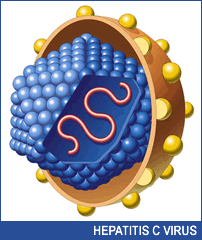Long-term
Viral Suppression with Telaprevir Combination Therapy, Resistance Declines
over Time
 |
 |
 |
 |
 |
|
| SUMMARY:
Chronic hepatitis C patients who achieve sustained virological
response after treatment with the HCV protease inhibitor telaprevir
plus pegylated
interferon and ribavirin continue to have undetectable
viral load with long-term follow-up, according to findings
from the EXTEND study presented at the recent American Association
for the Study of Liver Diseases "Liver Meeting"
(AASLD 2010) in Boston. Among non-responders,
telaprevir resistance mutations disappeared over time, suggesting
that the drug could be used again for re-treatment. |
|
|
 |
 |
 |
 |
By
Liz Highleyman
 Current
standard therapy for genotype 1 chronic hepatitis C virus (HCV) infection
consists of pegylated interferon
plus ribavirin for 48 weeks. Interferon-based therapy can cause
difficult side effects, however, and only about half of people with
this hard-to-treat genotype achieve a cure.
Current
standard therapy for genotype 1 chronic hepatitis C virus (HCV) infection
consists of pegylated interferon
plus ribavirin for 48 weeks. Interferon-based therapy can cause
difficult side effects, however, and only about half of people with
this hard-to-treat genotype achieve a cure.
New drugs that directly target steps of the viral lifecycle -- such
as HCV protease and polymerase inhibitors -- are in the final stages
of development. While these agents are likely to initially be used in
combination with pegylated interferon/ribavirin, they should shorten
treatment duration and improve the likelihood of sustained response.
Sustained virological response (SVR) to hepatitis C treatment is defined
as continued undetectable HCV RNA 24 weeks after completion of therapy.
Studies have shown that SVR is effectively a cure in people treated
with a full course of pegylated interferon/ribavirin -- with very few
individuals experiencing subsequent relapse -- but this has not been
well studied for new antiviral agents.
Stefan Zeuzem from J.W. Goethe University Medical Center in Frankfurt
and fellow investigators with the EXTEND study conducted long-term follow-up
of participants in Phase 2 clinical trials of the HCV protease inhibitor
telaprevir
in combination with pegylated
interferon alfa-2a (Pegasys) and ribavirin.
The study
is scheduled to last for 3 years. At the Liver
Meeting, researchers presented data from an interim analysis of
virological response durability among patients who achieved SVR, as
well as changes in HCV mutations among people who did not achieve SVR.
The analysis
included 202 patients selected from among the nearly 900 participants
who received at least 1 dose of telaprevir in the Phase 2 trials PROVE1
and PROVE2 (treatment-naive patients), PROVE3
(prior non-responders), or Study
107 (rollover from the PROVE trials). EXTEND will also enroll participants
from the Phase 3 ADVANCE,
ILLUMINATE, and REALIZE trials.
Patients
who achieved SVR (n = 123) were observed for a median follow-up period
of 22 months (range 5-35 months) after determination of sustained response
at 24 weeks. Participants who did not achieve SVR (n = 79) were followed
for a median of 25 months (range 7-36 months) after the end of their
initial trial.
Investigators
measured HCV RNA levels and used RT-PCR testing to sequence the HCV
NS3 protease, looking for amino acid changes at positions 36, 54, 155,
and 156 that have been linked to decreased telaprevir susceptibility.
Results
 |
All
but 1 patient with SVR (122 out of 123, or 99%) maintained undetectable
HCV viral load during follow-up. |
 |
1
individual from PROVE2 -- who had discontinued therapy prior to
the scheduled end of treatment -- experienced late relapse at 47
weeks. |
 |
89%
of non-SVR patients (50 out of 56) who had viral variants with reduced
telaprevir susceptibility at the end of the earlier studies no longer
showed evidence of resistance by the end of follow-up. |
 |
There
was no evidence to suggest that time to loss of resistant HCV variants
varied according to treatment arm, duration of telaprevir, or type
of non-response (e.g., viral breakthrough on treatment vs post-treatment
relapse). |
 |
Analysis
of a subset of non-responders found that viral populations from
every patient returned to their pre-treatment state. |
"In
this interim analysis, SVR after telaprevir-based therapy was durable,
with 122 of 123 subjects maintaining HCV RNA undetectable during a median
22 months follow-up," the investigators concluded. "Amongst
patients who did not achieve SVR after telaprevir-based therapy, variants
associated with decreased sensitivity to telaprevir were no longer detectable
in 89% of patients within the study period."
The replacement
of resistant HCV variants by wild-type (non-mutated) virus over time
suggests that telaprevir may be effective if used later as part of an
attempt at re-treatment. Therefore, people who did not achieve sustained
response with telaprevir plus pegylated interferon/ribavirin may still
be eligible for future re-treatment with all-oral combinations of direct-acting
agents including telaprevir.
Some degree
of telaprevir resistance may remain, however, as the PCR test used in
this analysis only detected variants that made up about 20% of an individual's
total virus population.
Investigator affiliations: Johann Wolfgang Goethe University Medical
Center, Frankfurt am Main, Germany; Johns Hopkins University School
of Medicine, Baltimore, MD; INSERM Unit 871, Lyon, France; University
of Cincinnati College of Medicine, Cincinnati, OH; University of Padova,
Padova, Italy; Harvard School of Public Health, Boston, MA; Tibotec
BVBA, Mechelen, Belgium; Vertex Pharmaceuticals Incorporated, Cambridge,
MA; Tibotec Inc., Titusville, NJ; Duke University Medical Center, Durham,
NC.
11/23/10
Reference
S
Zeuzem, MS Sulkowski, F Zoulim, and others. Long-term Follow-up of Patients
with Chronic Hepatitis C Treated with Telaprevir in Combination with
Peginterferon Alfa-2a and Ribavirin: Interim Analysis of the EXTEND
Study. 61st Annual Meeting of the American Association for the Study
of Liver Diseases (AASLD 2010). Boston, October 29-November 2, 2010.
Abstract 227.